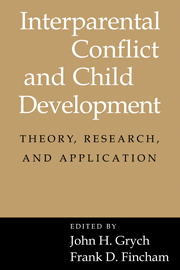Book contents
- Frontmatter
- Contents
- List of Contributors
- Preface
- Interparental Conflict and Child Adjustment: An Overview
- Part One Foundations
- Part Two Basic Processes
- Part Three Family and Peer Contexts
- 9 Interparental Conflict and Parent–Child Relationships
- 10 Sibling Relationships and Interparental Conflict
- 11 Managing Marital Conflict: Links with Children's Peer Relationships
- 12 Domestic Violence and Child Adjustment
- 13 When Conflict Continues after the Marriage Ends: Effects of Postdivorce Conflict on Children
- 14 Marital Conflict in Stepfamilies
- Part Four Applications
- Part Five Future Directions
- Author Index
- Subject Index
11 - Managing Marital Conflict: Links with Children's Peer Relationships
Published online by Cambridge University Press: 01 May 2010
- Frontmatter
- Contents
- List of Contributors
- Preface
- Interparental Conflict and Child Adjustment: An Overview
- Part One Foundations
- Part Two Basic Processes
- Part Three Family and Peer Contexts
- 9 Interparental Conflict and Parent–Child Relationships
- 10 Sibling Relationships and Interparental Conflict
- 11 Managing Marital Conflict: Links with Children's Peer Relationships
- 12 Domestic Violence and Child Adjustment
- 13 When Conflict Continues after the Marriage Ends: Effects of Postdivorce Conflict on Children
- 14 Marital Conflict in Stepfamilies
- Part Four Applications
- Part Five Future Directions
- Author Index
- Subject Index
Summary
In recent years there has been an increasing recognition of the association between marital conflict and children's adjustment (Fincham, 1998; Grych & Fincham, 1990). In spite of the increase of attention to the effects of familial conflict on children's functioning, there has been little attention devoted to children's competence with peers. The goal of this chapter is to address this relatively unexplored issue of the links between marital conflict and children's peer relationships.
Importance of Examining Links between Marital Conflict and Peer Relationships
Understanding children's social competence with peers as an outcome of marital conflict is critical for several reasons. First, the correlates and predictive associations of social incompetence (including truancy, school dropout, and criminality) have been well documented (Parker & Asher, 1987). Second, as Wasserstein and La Greca (1996) found in their investigation of marital discord and peer support among children in middle childhood, children's close friendships moderate the negative effects of marital discord. This finding highlights the importance of understanding the links between marital discord and children's peer relationships. Third, although most past research in this area has used unitary measures of child adjustment (e.g., internalizing or externalizing problems), these global evaluations need to be complemented by more specific indices in order to identify particular outcomes that may be more proximal or distal to particular aspects of marital conflict (Grych & Fincham, 1990). These global problems may, in fact, be associated with peer relationships, but there is little research that has investigated how children from families high in marital conflict are perceived socially by their peers and teachers and their level of acceptance in peer contexts.
- Type
- Chapter
- Information
- Interparental Conflict and Child DevelopmentTheory, Research and Applications, pp. 291 - 314Publisher: Cambridge University PressPrint publication year: 2001
- 24
- Cited by



